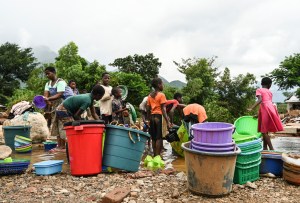By Wanjohi Kabukuru and Vitus-Gregory Gondwe,
The Associated Press
Authorities are still getting to grips with the scale of Cyclone Freddy’s destruction in Malawi and Mozambique since late March 11, with over 370 people confirmed dead, several hundred still missing and tens of thousands displaced.
On March 17, Malawi authorities said Freddy killed at least 326 people, with 200 still missing. There are hundreds of evacuation centers set up across the country for survivors. Malawi’s president, Lazarus Chakwera, declared a 14-day national mourning period on March 16.
In Mozambique, authorities said at least 53 were killed since March 11, with 50,000 more still displaced. It’s expected that the death toll in both nations will continue to climb.
Cyclone Freddy dissipated over land late March 15 after it made second landfall in Mozambique and then Malawi over the weekend and caused mass devastation in several regions, including Malawi’s financial capital, Blantyre.
“A lot of areas are inaccessible, restricting movement of assessment and humanitarian teams and life-saving supplies,” said Paul Turnbull, the World Food Program’s director in Malawi. “The true extent of the damage will only be revealed once assessments have been concluded.”
Both nations were already facing a cholera outbreak before the cyclone hit and there are fears than the flooding could worsen the spread of water-borne diseases. Mozambique was also dealing with Freddy’s first battering and floods earlier in the year.
Scientists say human-caused climate change has worsened cyclone activity, making them wetter, more intense and more frequent.
Cyclone Freddy has ravaged southern Africa since late February, when it pummeled Mozambique, Madagascar and Réunion. It then looped back on to the mainland after regaining strength over the Mozambique Channel.
Freddy first developed near Australia in early February and the World Meteorological Organization has convened an expert panel to determine whether it has broken the record for the longest-ever cyclone in recorded history.
___
Alexandre Nhampossa and Tom Gould contributed to this report from Maputo, Mozambique. Kabukuru reported from Mombasa, Kenya.
The post Death toll rises, African locals pick up pieces after Cyclone Freddy appeared first on AFRO American Newspapers .











